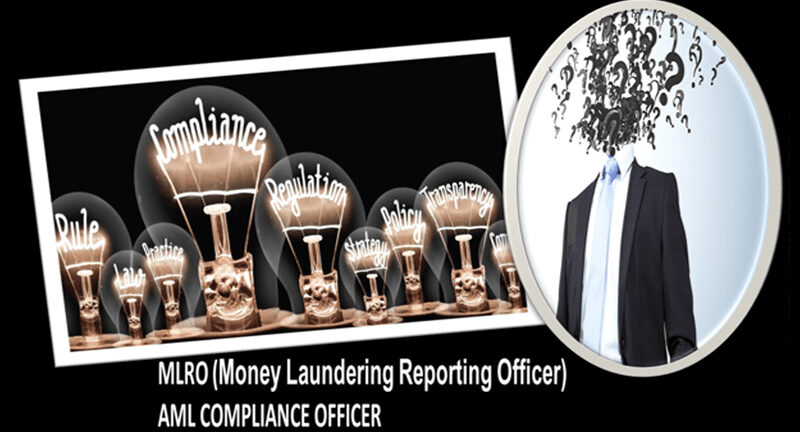Money Laundering Reporting Officer (MLRO) or Anti-Money Laundering Officer (AMLO) is a Compliance professional who oversees the firm’s anti-money laundering/countering the financing of terrorism framework.
Who is a Money Laundering Reporting Officer (MLRO)
In order to oversee internal anti-money laundering policies and remain compliant with important regulations, all regulated entities DNFBPs, (Designated Non-Financial business professions) and Financial institutions are required to appoint an MLRO (Money Laundering Reporting officer) / AML compliance officer; under UAE Cabinet decision no. (10) of 2019 Concerning the implementing regulation of decree law no. (20) of 2018 on anti- money laundering and combating the financing of terrorism and illegal organizations, Section 8 ,Article (21) ,Compliance Officer Tasks.
What Does an MLRO Do?
The role of Money Laundering Reporting Officer defined in UAE Cabinet decision no. (10) of 2019 Concerning the implementing regulation of decree law no. (20) of 2018 on anti- money laundering and combating the financing of terrorism and illegal organizations is; The compliance officer shall have the appropriate competencies and experience and under his or her own responsibility and shall perform the following tasks:
- Detect Transactions relating to any Crime.
- Review, scrutinise and study records, receive data concerning Suspicious Transactions,
- Take decisions to either notify the FIU
- Or maintain the Transaction with the reasons for maintaining while maintaining complete confidentiality.
- Review the internal rules and procedures relating to combating the Crime.
- Review their consistency with the Decretal-Lawand the present Decision.
- Assess the extent to which the institution is committed to the application of these rules and procedures
- Propose what is needed to update and develop these rules and procedures.
- Prepare and submit semi-annual reportson these points to senior management.
- and send a copy of that report to the relevant Supervisory Authorityenclosed with senior management remarks and decisions.
- Prepare, execute and document ongoing training and development programs.
- Plansfor the institution’s employees on Money Laundering and the Financing of Terrorism and Financing of Illegal Organisations, and the means to combat them.
- Collaborate with the Supervisory Authority and FIU.
- Provide them with all requested data.
- Allow their authorized employees to view the necessary records and documents that will allow them to perform their duties.
Who should be an MLRO?
The law says that the compliance officer shall have the appropriate competencies and experience. While there are no regulatory requirements for who should be appointed MLRO, senior management should consider the following factors when selecting an AML Compliance Officer.
Authority
AML Officers not only monitor and handle a variety of sensitive financial data, but must interact with senior management and the board of directors, and with the authorities on a regular basis, therefore MLROs should hold a position of sufficient seniority within their companies – so that they can access the files and information they need to carry out their anti-money laundering duties. Their position should also allow them to design, implement, and enforce their firm’s compliance systems and procedures.
Given the legal implications of the role, your MLRO should be at least a director-level employee, with the knowledge and experience to be able to make decisions with confidence.
Risk Management MLROs must be able to assess money-laundering risk ensuring that their companies are not exposed to criminal risk, and does not inadvertently facilitate financial crime. This skill requires not only an understanding of criminal methodologies but an understanding of the behavior and business practices of customers and clients, who may themselves be exposed to risk.
Risk-assessment is important for MLROs because they are responsible for calibrating their firm’s anti-money laundering systems to suit their compliance obligations, Avoiding the legal liabilities of under-compliance and the potentially costly burdens of over-compliance.
Legal Aspects Knowledge
An MLRO /AML compliance Officer is required to be fully knowledgeable and skilled in all areas of laws and regulations. This knowledge and expertise should go beyond internal AML systems and controls, and extend to methodologies of money laundering (and its associated criminal activities), and to the potential risk posed by certain customers and clients. Having strong grasp on relevant laws and legal aspects is very important since they are required to disclose sensitive information to the Authorities when required– with legal implications for their companies and its employees.
Knowing what information must be revealed, and when, is therefore, a central focus of the MLRO mandate.
With this in mind, while an MLRO does not necessarily need to be legally-trained, knowledge of the field is useful. Alternatively, an MLRO might be given access to good legal advice about this aspect of their role.
PENALTY FOR FAILURE TO APPOINT COMPLIANCE OFFICERAs per UAE CABINET RESOLUTION NO. (16) OF 2021, list of violations and administrative fines. There is a penalty of AED 50,000 on Failure to appoint a compliance officer.
KEY TAKEAWAY
Dedication, honesty and integrity are fundamental traits for an MLRO.AML compliance is a constantly evolving field, so your Compliance Officer’s expertise should reflect the current regulatory climate.

Alia Noor (FCMA, CIMA, MBA, GCC VAT Comp Dip, Oxford fintech programme, COSO Framework)
Associate Partner
Ahmad Alagbari Chartered Accountants






